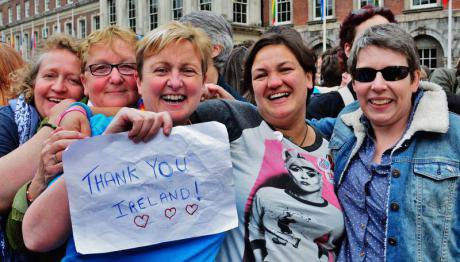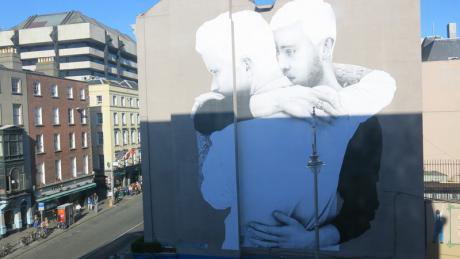
Dubliners celebrating Ireland's marriage equality referendum. Demotix/ Robin English. All rights reserved.
Since its greedy omnipotence in the 1980s, the catholic church in Ireland has been blown into ignominy. It is probably terminal. The gay referendum to inscribe equality for gay people in the Irish constitution produced an overwhelming historic defeat for Ireland’s patriarchal theocracy, and a triumph for an inclusive, open, relaxed and modern sexual culture.
More than anyone might have imagined, the result of the 20 May referendum produced a rare experience of what can only be described as political joy.
Within a generation, Ireland’s conversation with itself has moved from pitiless misogyny to exemplary, radical generosity.
Remaining grumps
But there are fogeyish grumps and other worries that while gay rights triumph, women’s rights remain marginalised. Do they have good grounds?
That equality between gay and straight people should demand a constitutional referendum is a peculiarity of Irish history: the power of the church embedded patriarchal sex and marriage not only in law but in the constitutional foundations of the state.This very power provoked the most intense, engaged and educated debate about gay rights anywhere on the planet.
During the campaign catholic former president, Mary McAleese used her religious faith as a resource, a strength, rather than as a blight in this great debate. Her voice typified the revolution in the language of Ireland’s sexual politics: they became we. Values that once scaffolded authoritarianism, bigotry, dread and bleak piety, have been rearticulated as expansive and democratic; Ireland isn’t heaven, but it is that extraordinary thing: a society that regards itself as capable of change.
Great day
The eminent Irish journalist Fintan O’Toole describes this historic gesture towards gay people as more than tolerance, much more:
Gay people, he writes, have given ‘all of Irish democracy one of its greatest days.’
That spirit is reciprocated by the gay movement: Ireland’s great scholar activist, Senator David Norris - a James Joyce expert, and gay campaigner who led a marathon campaign to excise the legal ban on homosexuality from the constitution; finally, it triumphed in 1993. After the referendum he said, ‘we’ve been brought on board as equal citizens by the generosity and decency of our straight fellow citizens.’
The modus operandi of the campaign was always about being kind, up close and personal.
However, the more-than-tolerance ethos of the campaign couldn’t calm the bilious misanthropy of London-based Spiked and the Institute of No Ideas: one of its dogmatists, Brendan O’Neill, read all of this as its antithesis; the world the Institute of No Ideas inhabits is an unhappy place that routinely hails protests against intimate oppression as hysteria or tyranny, which perhaps explains how O’Neill could complain at intolerance.
Not even Ireland’s defeated bishops interpreted the tone of the campaign or the 62 per cent vote for gay equality that way.
Not even the church thinks No-voters will be victimised, that they’ll lose anything other than the misery of others. O’Neill’s prejudice takes him to ahistorical excess that not even the most demonic among the devout would recognise: the No voters, he declared, ‘found themselves treated in the same way Old Ireland might have treated teen fornicators.’
What can he mean? That No-voters will be shamed and incarcerated for moral offence, that the institutions of cold, cruel charity that warehoused thousands of moral offenders will open their gates again to abuse another minority?
He is wrong: what we know for sure is that the New Ireland will not be animated by shame.
Women’s rights
But there is another complaint: that Ireland can concede gay rights but still refuses to recognise women’s reproductive rights.
They are violently contested in the US, where religion and the patriarchal family remain pillars of Republican fundamentalism.
Katha Pollitt, veteran, and venerable columnist with The Nation ventures that in the US gay rights are winning whilst women’s reproductive rights are losing.
There are no losers with gay rights, she suggests, but they won’t necessarily alter our social or economic arrangements.
By contrast, reproductive rights are, so to say, re-distributive, they take power from men.
But is Pollitt asking the right question? Is this a credible conclusion, and does her hypothesis travel to this side of the Atlantic?
Her terms are vulnerable to a kind of economic essentialism, as if culture is not a material presence.
It is not true that gay rights don’t challenge ‘social or economic arrangements’, is it? They already have. Church and state naturalised sexuality as patriarchal and procreative, as the institutionalisation of men’s domination over women and the criminalisation of gay men - all of that is altered by feminist and gay campaigns for equality and human rights.
If marriage depended on the exclusion of gay love, then its inclusion fundamentally shakes its core function for patriarchy.
Women have been among the great pioneers in gay rights law reform: certainly, in the UK, lesbian mothers’ campaigns in the courts and in the culture have been instrumental in scything through the forests of myth and mystification of straight bigotry. In Ireland, two heralds of the gay referendum campaign are Dublin Senator Katherine Zappone and Ann Louise Gilligan: progressive educationists who have been together for more than three decades, who married in Canada in 2003 and have conducted a canny legal campaign since then for legal recognition in Ireland.
Among the images of crowds celebrating circulating around the world the weekend after the referendum were these two middle aged women kissing.
Pollitt’s critique minimises - and even erases - women’s impact on gay (and straight) politics, she tends to see gay as male. But in the UK at least lesbian mothers are the invisible stars of the rise and rise of movements for gay equality, they have launched an arrow into the heart of patriarchy.
Lesbian mothers confronted straight society with those faculties and responsibilities that lesbians share with all women; lesbians are, after all, nothing if not women. A generation ago lesbian mothers lost custody of their children in the courts because they were lesbians. Now they don’t.
Reproductive rights aren’t just negative, the right to say no, the right to not get pregnant - they are also about the right to say yes to desire. Sexuality is social and sexuality shared with others is always about the politics of pleasure and care, property and procreation.
Having secured its control over sexual life in referendums in the 1980s, the catholic church seemed unassailable; conservative catholicism locked Ireland in its cold house. But sex and sin, the very themes that seemed to naturalise its power, were also its downfall.
Onward momentum

Large mural appears in Dublin city centre. Demotix/Brendan Donnelly. All rights reserved.
The Coalition to Repeal the Eighth Amendment--which has been immersed in the gay referendum campaign--is building momentum, and after recovering from the effort and the celebrations had this to say:
“The landslide victory for marriage equality was a historic and thrilling victory and clears the way for so much unfinished business. We need to build on the huge support for equality shown in the last months and weeks by people of all ages, up and down the country and work to repeal the eighth amendment.
“The presence of the eighth amendment in the Irish constitution is a source of discrimination against all women living in Ireland. It particularly affects marginalised women who have suffered disproportionately for decades; migrant women, women with low or no income, women who are unable to travel for whatever reason, women facing a crisis pregnancy and women who need an abortion for medical reasons.
“We welcome the comments made by ministers from both government parties about the need to continue the momentum for social change in Ireland by repealing the eight amendment. We are particularly encouraged by the Tánaiste Joan Burton’s pledge of support for a referendum to repeal the eighth amendment. However, we would urge her to commit to holding the referendum in the lifetime of the government.
“Women in Ireland cannot afford to wait any longer. Every day 12 women are forced into exile and made to travel abroad to access abortion. Opinion poll after opinion poll indicates that an enormous shift in support for abortion reform and the electorate is overwhelmingly in support of repeal of the eighth amendment. Therefore we call on the government to build on this wonderful momentum for change, and give women living in Ireland full control over their reproductive choices.”
Burton announced that the Labour Party will put repeal of the 8th into its 2016 General Election manifesto.
Ireland’s churches and governments have been assailed on three fronts in the last three decades: child abuse, reproductive rights and homosexuality--but not at the same pace and in the same conditions; they do not meet the same forms of institutional resistance or bestow the same blessings.
Nor do they operate at each other’s expense, they don’t compete, their movements do not diminish each other--but they all diminish patriarchal theocracy.
If you enjoyed this article then please consider liking Can Europe Make it? on Facebook and following us on Twitter @oD_Europe
Read more
Get our weekly email
Comments
We encourage anyone to comment, please consult the oD commenting guidelines if you have any questions.